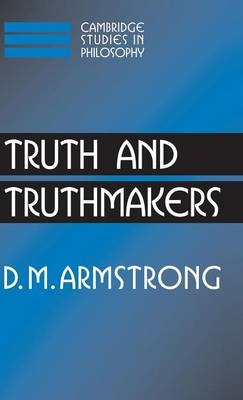
Truth and Truthmakers
Seiten
2004
Cambridge University Press (Verlag)
978-0-521-83832-0 (ISBN)
Cambridge University Press (Verlag)
978-0-521-83832-0 (ISBN)
In a clear, even-handed and non-technical discussion D. M. Armstrong makes a compelling case for truthmaking and its importance in philosophy. This book, first published in 2004, marks a significant contribution to the debate and will be of interest to a wide range of readers working in analytical philosophy.
Truths are determined not by what we believe, but by the way the world is. Or so realists about truth believe. Philosophers call such theories correspondence theories of truth. Truthmaking theory, which now has many adherents among contemporary philosophers, is a recent development of a realist theory of truth, and in this book, first published in 2004, D. M. Armstrong offers the first full-length study of this theory. He examines its applications to different sorts of truth, including contingent truths, modal truths, truths about the past and the future, and mathematical truths. In a clear, even-handed and non-technical discussion he makes a compelling case for truthmaking and its importance in philosophy. His book marks a significant contribution to the debate and will be of interest to a wide range of readers working in analytical philosophy.
Truths are determined not by what we believe, but by the way the world is. Or so realists about truth believe. Philosophers call such theories correspondence theories of truth. Truthmaking theory, which now has many adherents among contemporary philosophers, is a recent development of a realist theory of truth, and in this book, first published in 2004, D. M. Armstrong offers the first full-length study of this theory. He examines its applications to different sorts of truth, including contingent truths, modal truths, truths about the past and the future, and mathematical truths. In a clear, even-handed and non-technical discussion he makes a compelling case for truthmaking and its importance in philosophy. His book marks a significant contribution to the debate and will be of interest to a wide range of readers working in analytical philosophy.
David Armstrong's many publications include A Materialist Theory of Mind (1968) and A World of States of Affairs (1997).
1. An introduction to truthmakers; 2. The general theory of truthmaking; 3. Epistemology and methodology; 4. Properties, relations and states of affairs; 5. Negative truths; 6. General truths; 7. Truthmakers for modal truths: Part 1, possibility; 8. Truthmakers for modal truths: Part 2, necessity; 9. Numbers and classes; 10. Causes, laws and dispositions; 11. Time.
| Erscheint lt. Verlag | 27.5.2004 |
|---|---|
| Reihe/Serie | Cambridge Studies in Philosophy |
| Zusatzinfo | 1 Tables, unspecified; 2 Line drawings, unspecified |
| Verlagsort | Cambridge |
| Sprache | englisch |
| Maße | 143 x 228 mm |
| Gewicht | 346 g |
| Themenwelt | Geisteswissenschaften ► Philosophie ► Erkenntnistheorie / Wissenschaftstheorie |
| Geisteswissenschaften ► Philosophie ► Philosophie der Neuzeit | |
| ISBN-10 | 0-521-83832-0 / 0521838320 |
| ISBN-13 | 978-0-521-83832-0 / 9780521838320 |
| Zustand | Neuware |
| Haben Sie eine Frage zum Produkt? |
Mehr entdecken
aus dem Bereich
aus dem Bereich
die Grundlegung der modernen Philosophie
Buch | Softcover (2023)
C.H.Beck (Verlag)
18,00 €


